The IDEAL Africa Packing List • What To Wear In Africa

Are you wondering what clothes to pack for Africa? Packing for Africa can be downright daunting if you’ve never been. Whether you’re on an overland safari, a Peace Corps assignment, a mission trip, or just traveling around the continent, it’s essential to make sure you’re prepared.
Once you get outside South Africa and African capital cities, it will be hard to replenish your wardrobe and even a little challenging to stock up on essentials, so you will want to ensure you arrive with the necessities. Many African cities have all the modern conveniences you would come to expect anywhere in the world. However, it can be challenging to find a lot of items in the more rural areas where many travelers head.
This Africa packing list is a guide for everyday travel around Africa. We traversed the continent, visiting nearly 20 countries, and have spent almost two years traveling around Africa. After all that time, we have nailed down what to pack for Southern, North, and Eastern Africa.
Tips For Your Africa Packing List
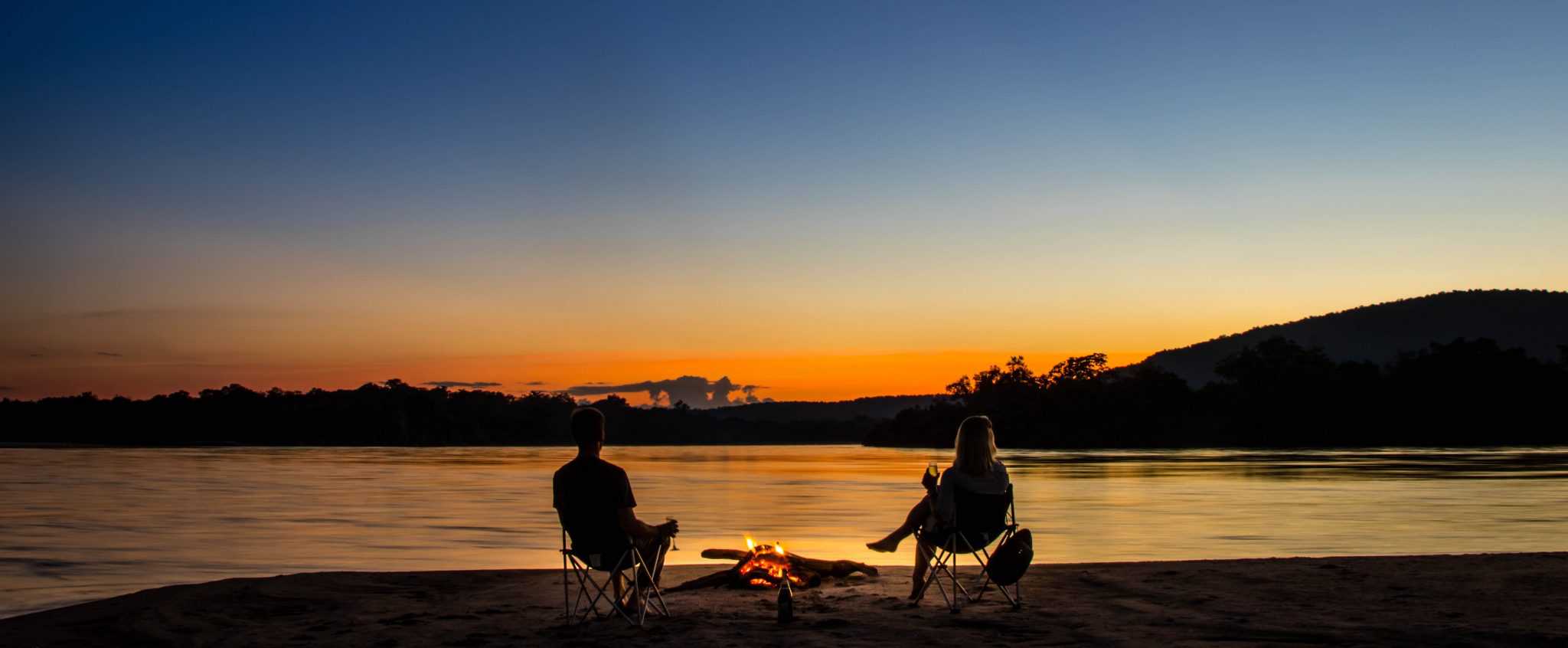
Africa is a huge and vast continent, and naturally, the climate varies a LOT based on the season and location. You have probably seen the movies about Africa where people are decked out in khaki, a pith safari hat, and binoculars. However, the truth is you probably won’t need any of that gear unless you are in the bush or on safari. Don’t worry if that is you – we have safari clothes covered here!
- Pack light if you plan to backpack, as travel days can be long in Africa. You’re more likely to regret packing too much than too little.
- Mesh/breathable packing cubes help separate damp and dirty clothes from clean ones.
- Sun protection is always a good idea, whether that is sunblock, hats, or UPF clothing.
- Adventure clothes such as hiking footwear and active clothes are great.
- Bring any essential toiletries or medications you may need.
- Shower sandals are always handy to have to protect your feet.
- Dark shades of blue attract the dreaded tsetse fly, found throughout pockets of Africa. So it’s best to try and avoid this color.
- Africa has some tremendous diving and reefs, but we suggest you pack reef-safe sunscreen to help preserve the reefs.
- Most of Africa dresses conservatively, so it’s best to dress sensibly and leave the booty shorts at home.
- Be sure to note what time of year you are traveling to Africa. The rainy season in Southern Africa varies greatly from the rainy season in Eastern Africa. If you are traveling during the rainy season a rain jacket is essential.

What To Wear in Africa
Hiking Shoes or Boots

A reliable pair of shoes is perhaps the most essential thing to pack in your bag. An excellent recommendation for a boot or shoe is the Merrell Moab. They’re dependable, comfortable, and, most importantly, a good value. If you want more classic options, we have a post on the best safari boots.

A good pair of shoes is worth their weight in gold because if you are anywhere outside South Africa, a quality pair of hiking shoes will be hard to come by. If you plan to walk around a lot, get thick rubber-soled shoes, as acacia thorns are prone to stab through thin shoes.
Merrell Moab III
Women’s
Men’s
Shower Shoes
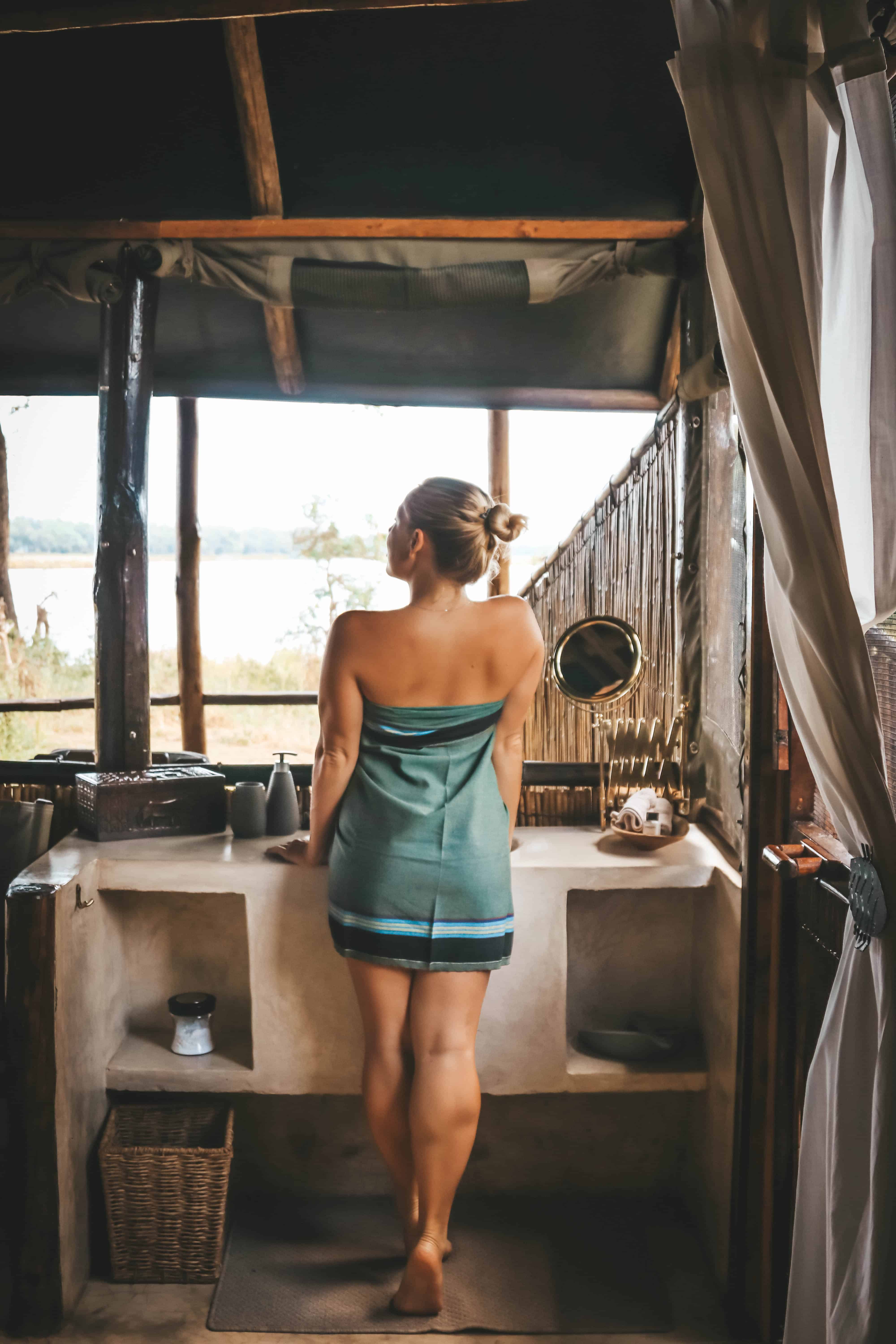
Some shower shoes to escape nasty floors are vital unless you’re staying only in five-star resorts and safari lodges. It also helps with the journey to shower if you’re camping, as you’ll often be walking around a lot outside. We even stayed at a few high-end safari lodges that were rustic with outdoor bathrooms, where we appreciated having sandals.
Shower Shoes
Sandals

You won’t want to live in hiking shoes, and you certainly don’t want to live in rubber shower shoes. A good pair of sandals is great for comfort on long travel days and under the hot African sun, like in Namibia or Egypt. Like the locals, we spend 90% of our time in a pair of sandals when traveling around Africa.
I travel with my Rainbow leather flip-flops as well as my Teva Hurricanes, which get me through anything. he only time we opt for our boots is on bush walks, long hikes, and dirty streets.
See Our Sandal Recommendations
Sarong
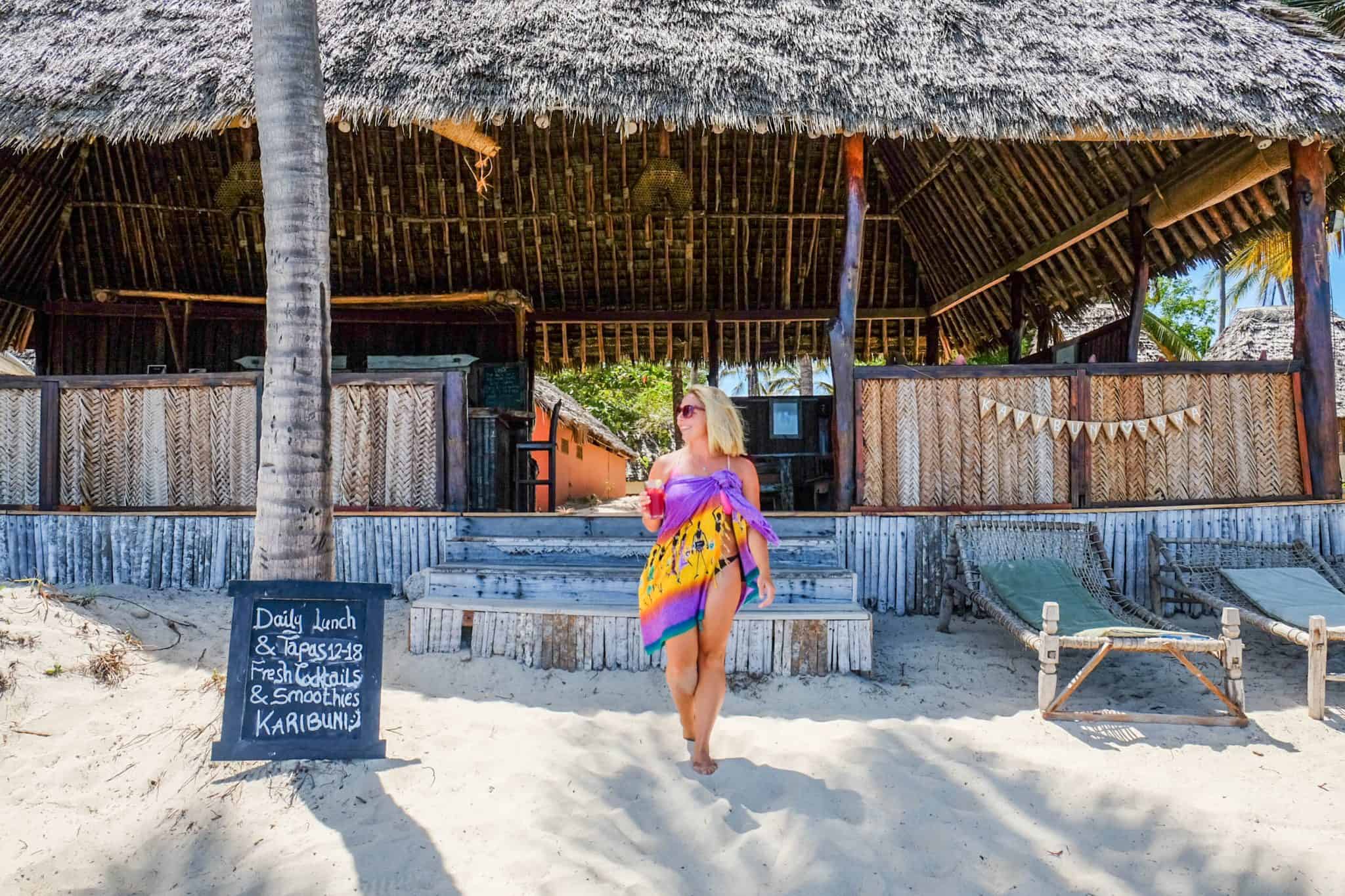
You will 100% be able to buy this from the local women and markets. African Batik fabric prints are all over the continent, and many cultures love to dress in fantastic colors. Sarongs are great for just about anything. You can use them to cover up at the beach, dry off after a shower, or wear them as a cute skirt. It’s even common for men to wear them at night when relaxing.
Keep in mind most Africans dress conservatively, so it’s best to have a decent length in the sarong. You do not need to pack this as it’s easy to find, but if you want one before you land, you can grab one easily online.
Sarongs
Hiking Pants

Lightweight pants made from synthetic material are tremendous to have in your pack. It’s what we wear most days when traveling around Africa as they’re comfortable, antibacterial, and protect our legs from mosquitos (malaria). We recommend neutral-colored pants as they’re great at hiding dirt and can match most shirt colors. What’s great is they’re useful beyond Africa as they are a travel staple, and we pack a pair everywhere we travel.
We love the pants from Kuhl. The Men’s Renegade and Women’s Freeflex are tremendous pairs of hiking pants at a reasonable price. They’re durable for how lightweight they are, perfect if you’re doing volunteer work or on more of an adventure. They also happen to be some of our favorite pants for safari.
Technical Pant Recommendations
Women’s Freeflex Pants
Men’s Renegade Rock Pants
Loose Pants
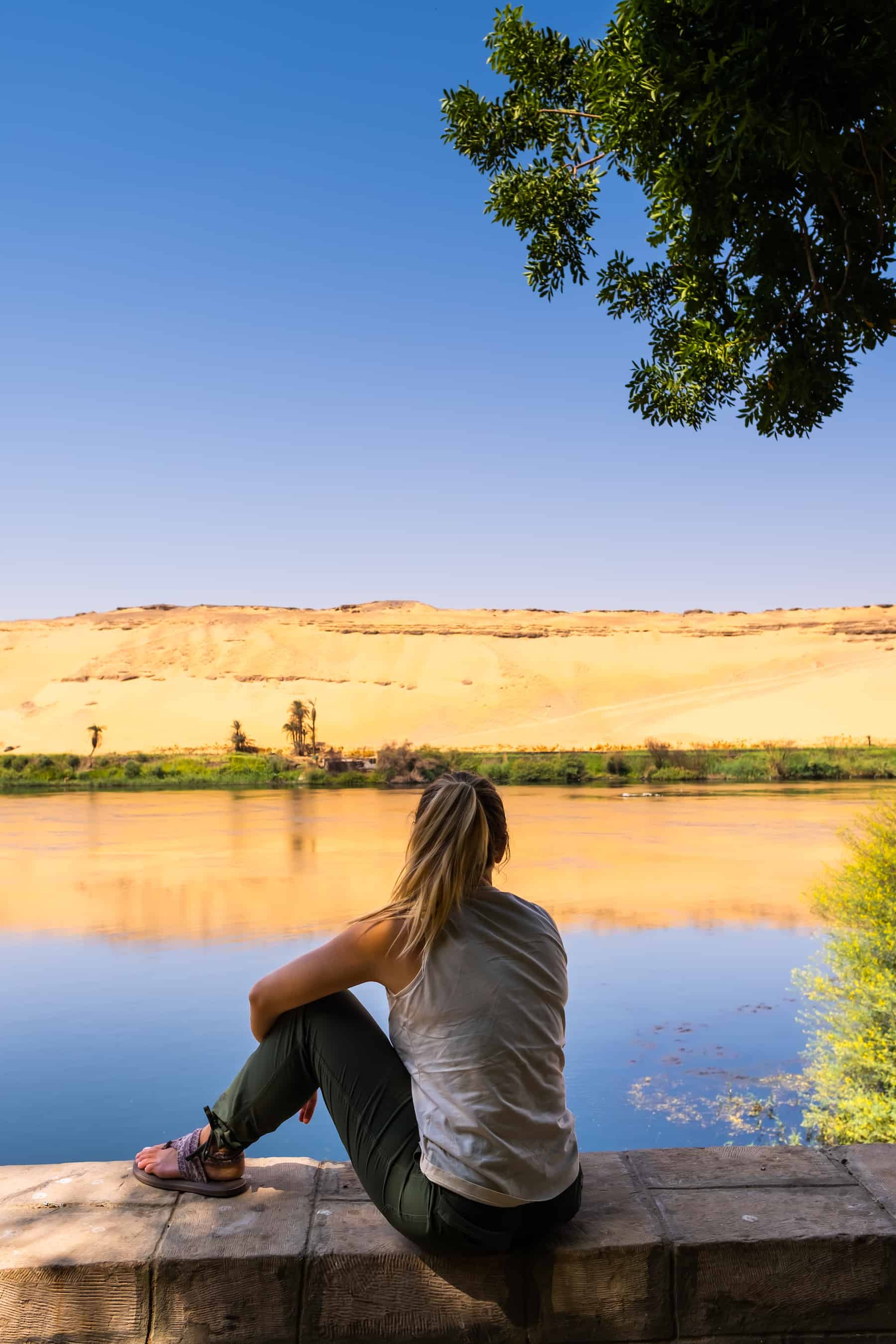
I love to wear relaxed pants when I travel. I’ve tried a bunch of pants and have fallen in love with a lightweight hiking pants called the Trailhead from Coalatree. Another great other option is the prAna Summit pants. These pants are seriously amazing! Packing loose or relaxed cotton pants would also be a good idea.

They are perfect for Africa, especially in the more conservative countries when it’s hot out. The men are lucky with the prAna Vaha pants. They are made from a hemp blend, the perfect material that feels stylish and comfortable.
Pant Recommendations
Men’s Vaha Pant
Women’s Trailhead Pant
Comfortable Shorts

A pair of comfortable shorts will keep you cool in the African heat. We consider them to be a staple men’s and women’s travel clothing item. The vast majority of days, you can find us in shorts as they are much more comfortable than pants. The standard outfit for us in Africa was a pair of shorts, a T-shirt, and sandals, if we’re honest.

If you’re worried about Malaria, remember that most mosquito bites occur at dusk and nighttime. So we’d often switch to pants in the evening, along with a good layer of insect repellant. Trail shorts are perfect for travel in Africa as they provide sun protection, and many contain insect repellants. Their stretchable fabric makes them ideal for sitting in a vehicle or bus for long hours throughout the day.
Check Out Our Short Recommendations
Women’s
Men’s
Lightweight Long Sleeve Shirt

I wear a long sleeve almost every night in Africa. Malaria is a real threat in most of Sub-Saharan Africa, and it’s best treated by prevention rather than medication. Every evening in malaria-prone regions, we wear long-sleeve shirts and pants to cover our skin as mosquitos bite in the evenings.
Long sleeves are also great for sun protection, and we wore them on desert walks in Namibia and a canoe safari on the Zambezi River. Temperatures aren’t always hot, as morning and the mountains can often be very cool a long-sleeved shirt provides more versatility. They’re also stylish and a classic look to sport in Africa.
See Our Recommendations For shirts
Lightweight Shirts
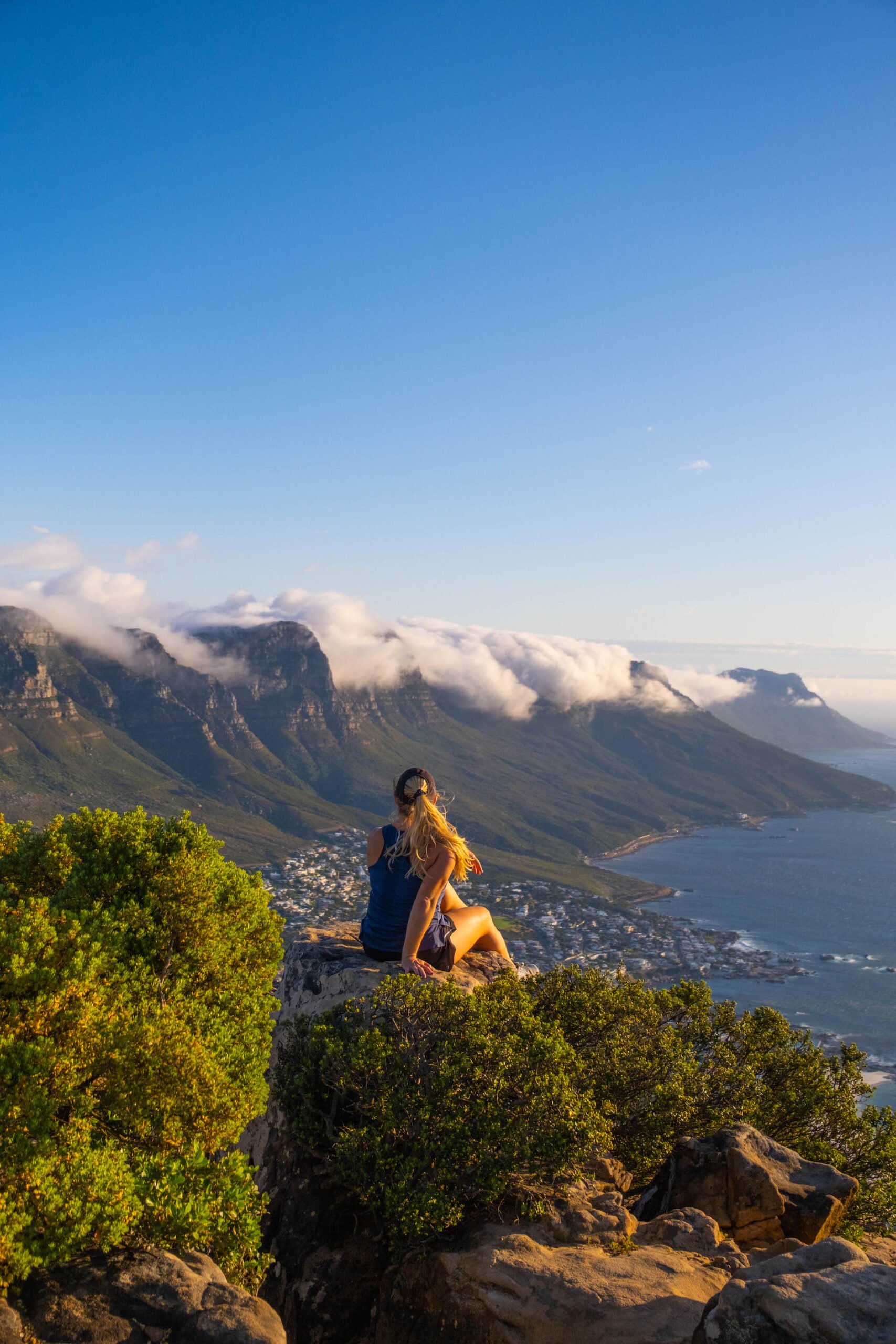
On an average day, we spend our time in a classic tee-shirt. It’s pretty hot in Africa, and it’s tough to beat the comfort of a short-sleeve shirt. Our absolute favorite technical shirts are the Outdoor Research Echo shirt. That being said, almost every shirt you pack for Africa should be loose and light-colored. It gets bloody HOT in Africa, and the last thing you want to wear is a skin-tight blacktop.
Outdoor Research Shirts
One Nice Outfit

Just because you’re traveling to Africa does not mean it’s all villages and wild bush. We found plenty of reasons to dress nice, from concerts, bars, restaurants, and vibrant art scenes. We’ve found plenty of bars and restaurants, especially if you’re in many major cities, from Cape Town to Nairobi or Accra.

I would recommend throwing at least one dress into your Africa packing list. Of course, if you find a local fashion designer, it’s always great to support local businesses!
Swimsuit
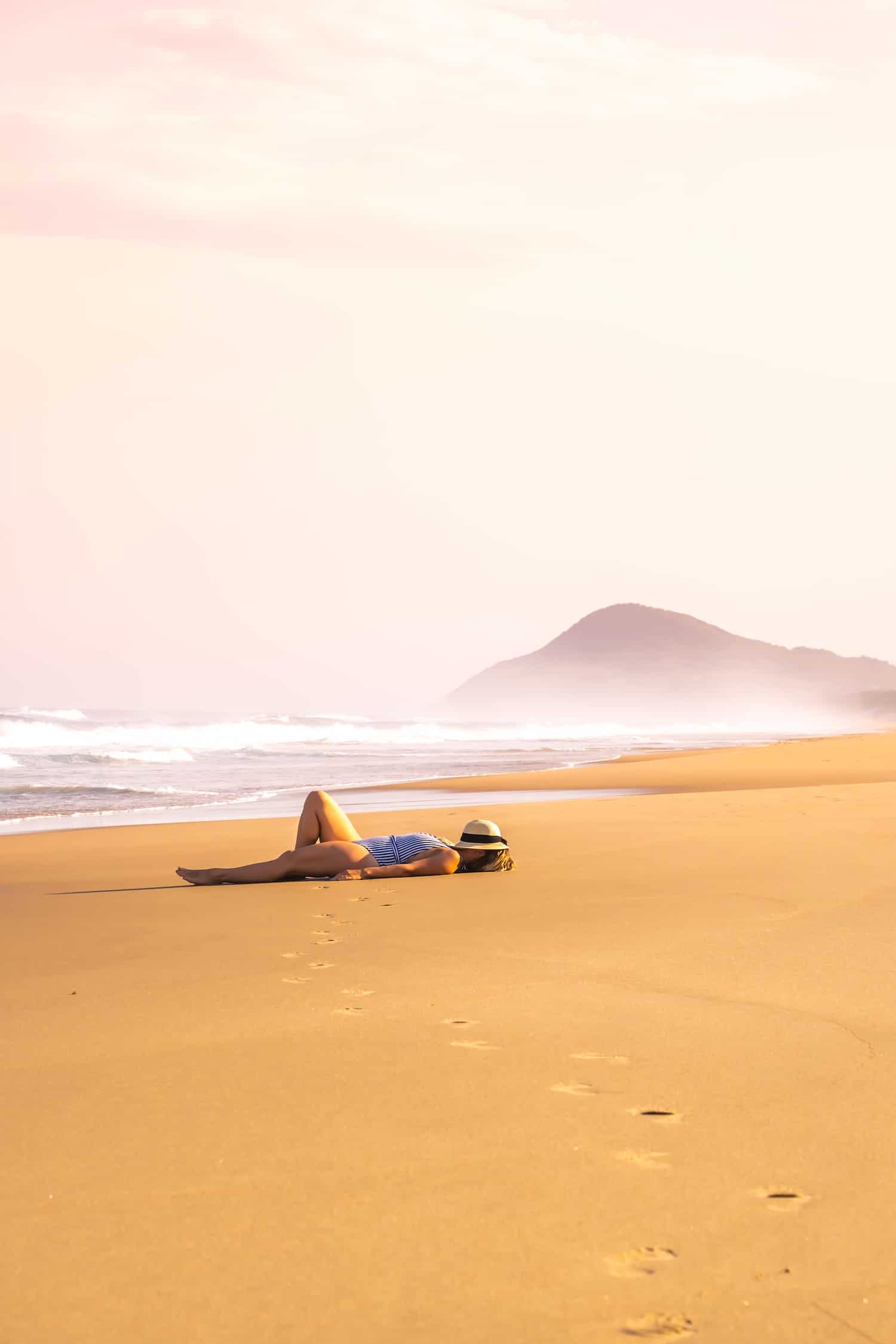
Outside of big cities, it will be hard to find a swimsuit. For women, one of the best brands for swimsuits I’ve found is Londre. They make amazing swimsuits that fit as nicely as they look. Many of their pieces are stylish yet supportive. They’re perfect if you plan to go surfing, bodyboarding, kitesurfing, or go snorkeling while in Africa. Cameron loves Quicksilver’s Amphibian shorts. The material looks like heavy cotton but is super lightweight and durable. Best of all, they look great on the beach or in town.
Swimsuit Recommendations
Women’s
Men’s
Warm Fleece
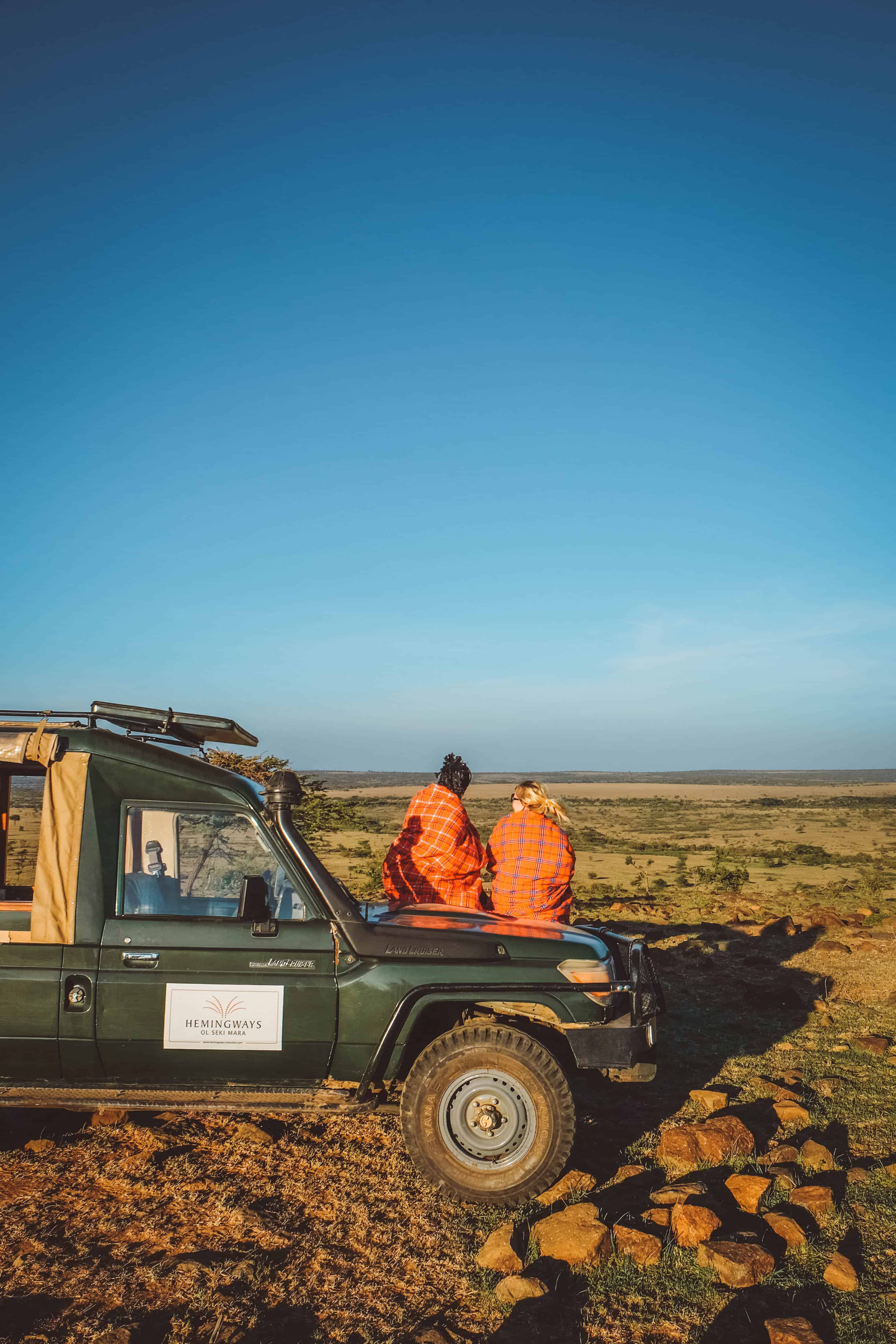
This all depends on where you are traveling, but you might be surprised to find out that Africa can get chilly in the evenings and mornings. We saw freezing temperatures in South Africa, snowboarded in Lesotho, and had to bundle up for the perpetual spring of East Africa.
Check the climate before you head off on your trip, and if you’re traveling extensively, you’ll encounter cold evenings. Consider it a necessity on your Africa packing list or at least something warm. When we spent an entire year in Africa, we were thankful to have both a great fleece and a down jacket too.
Fleece Recommendations
Women’s
Men’s
Shell Jacket
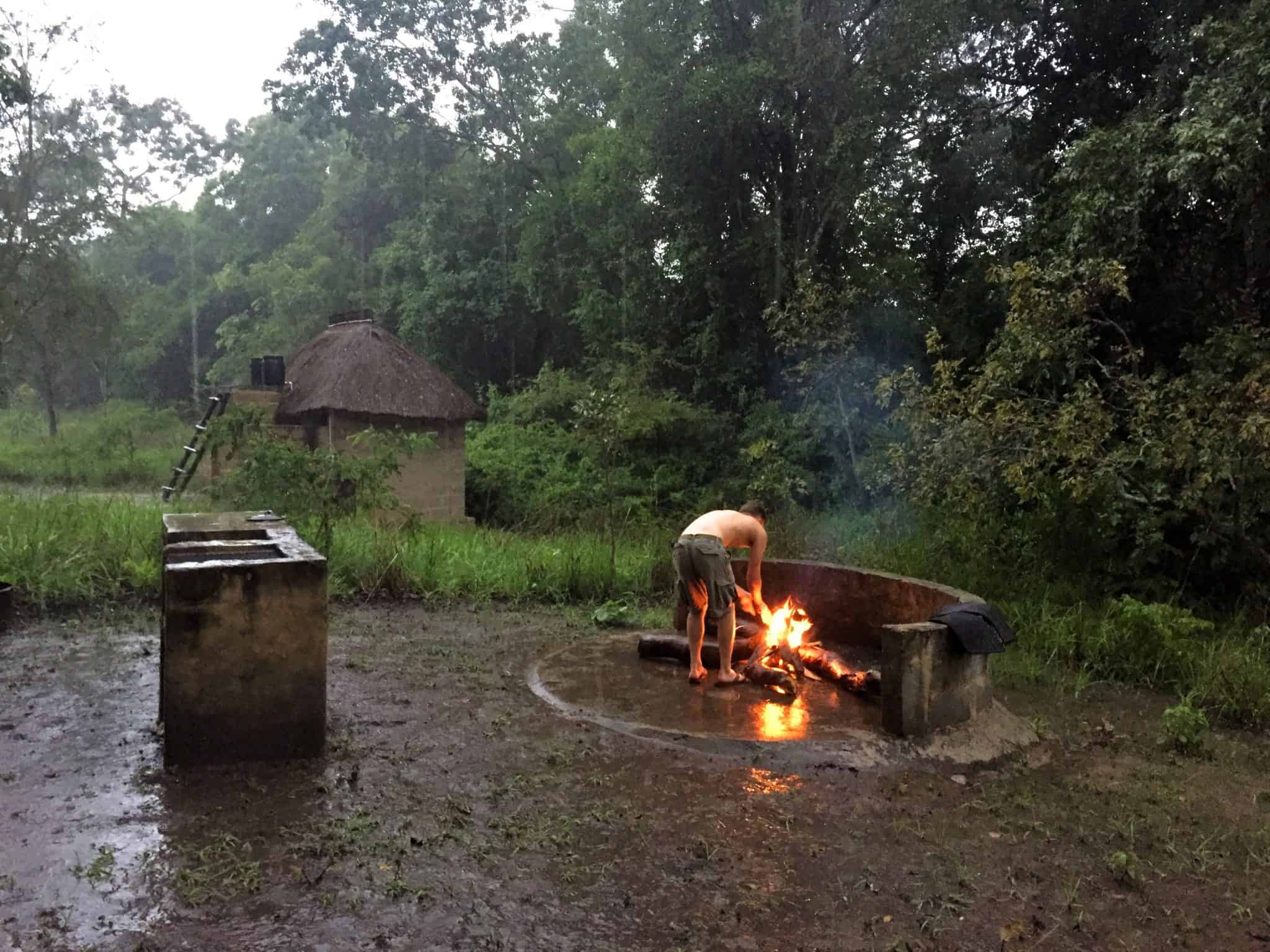
A great item in Africa is a shell jacket designed to protect you from the wind and rain. They’re tremendous at protection from the elements like rain, wind, sleet, and even snow. Of course, there are days when no jacket will protect you from the torrential downpours of the rainy season, like in the photo above in Zambia.
I have several shell jackets that I cycle throughout the year, but the one I reach for the most is my Arc’teryx Zeta LT Jacket. The LT line from Arc’teryx is a lightweight line, and it packs down well in my backpack. I can even wear it in the winter as a waterproof shell over my down jacket. If you want more help, we post on our favorite hiking jackets.
See Our Recommendations For Jackets
Sports Bras
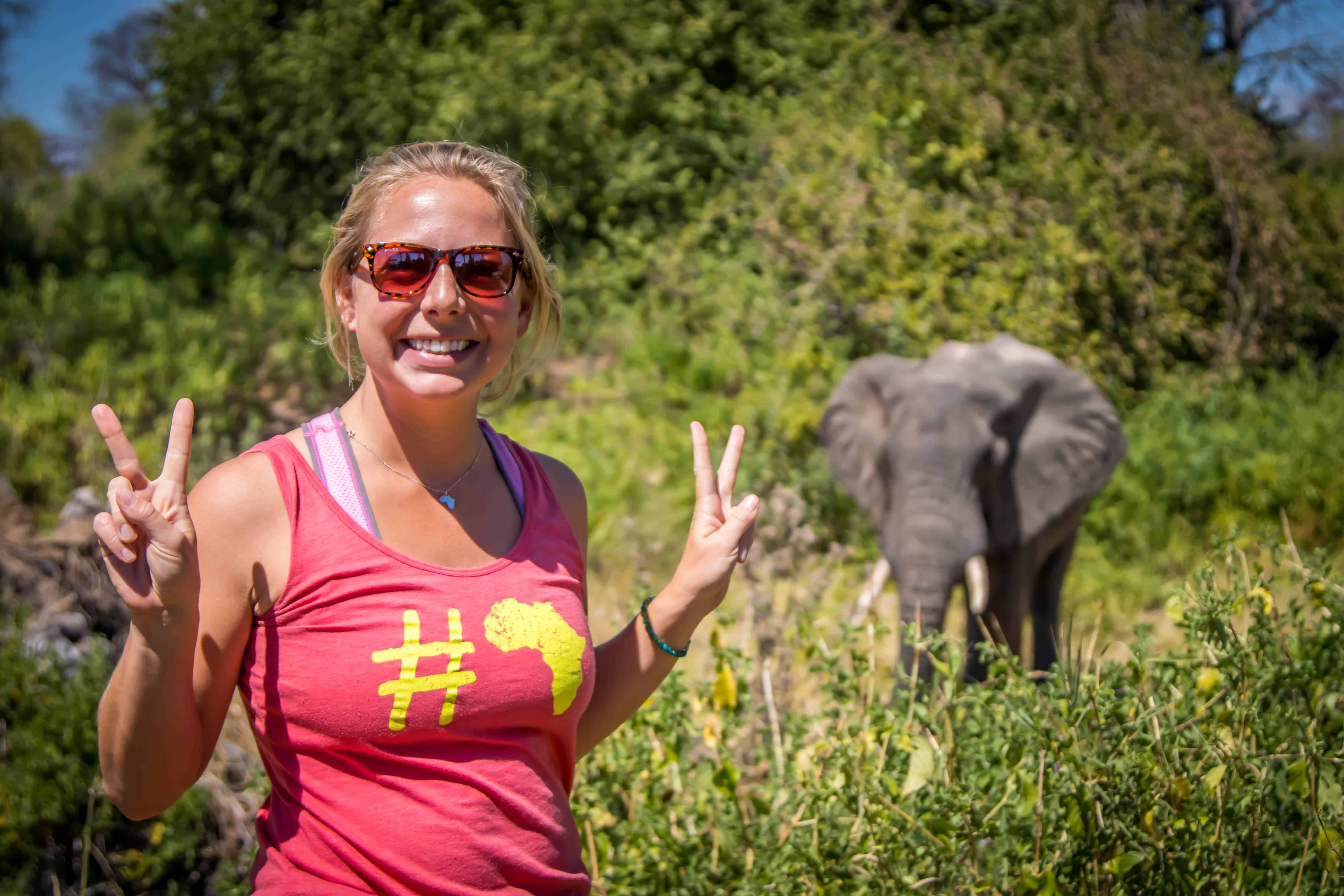
Nothing fancy here, but for the most part, you aren’t winning any fashion awards in the bush. I love Handful’s sports bras. They fit incredibly well, have removable pads, can be worn in multiple ways, and are smooth, non-chafing, and quick-drying. Seriously, they are the best sports bras I’ve ever owned! *Use code TWP20 for 20% off!
Sports Bra Recommendations
Sports Underwear
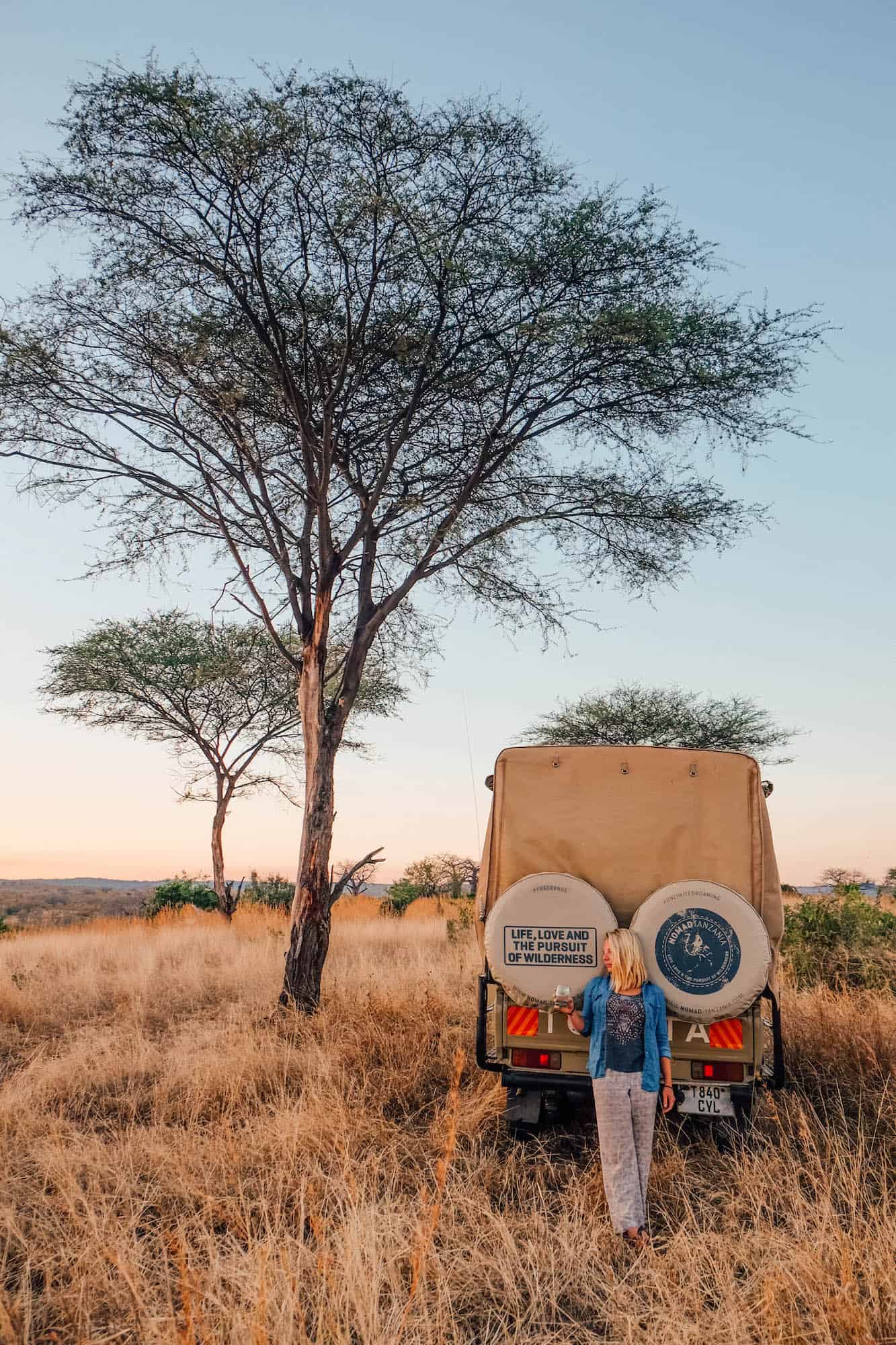
You should try to pack several pairs of sports underwear. Generally, we’ll pack five to seven pairs of underwear for a typical trip. We recommend several pairs of underwear made from wool or synthetic material. These materials are antimicrobial, so they stay fresh longer and can dry quickly overnight if you hand wash them. It’s best not to wear your typical cheap cotton undies for women. Women’s hygiene is vital, so antimicrobial undies, when active in the heat they are a lifesaver.
See Our Recommendations
Women’s
Men’s
Buff
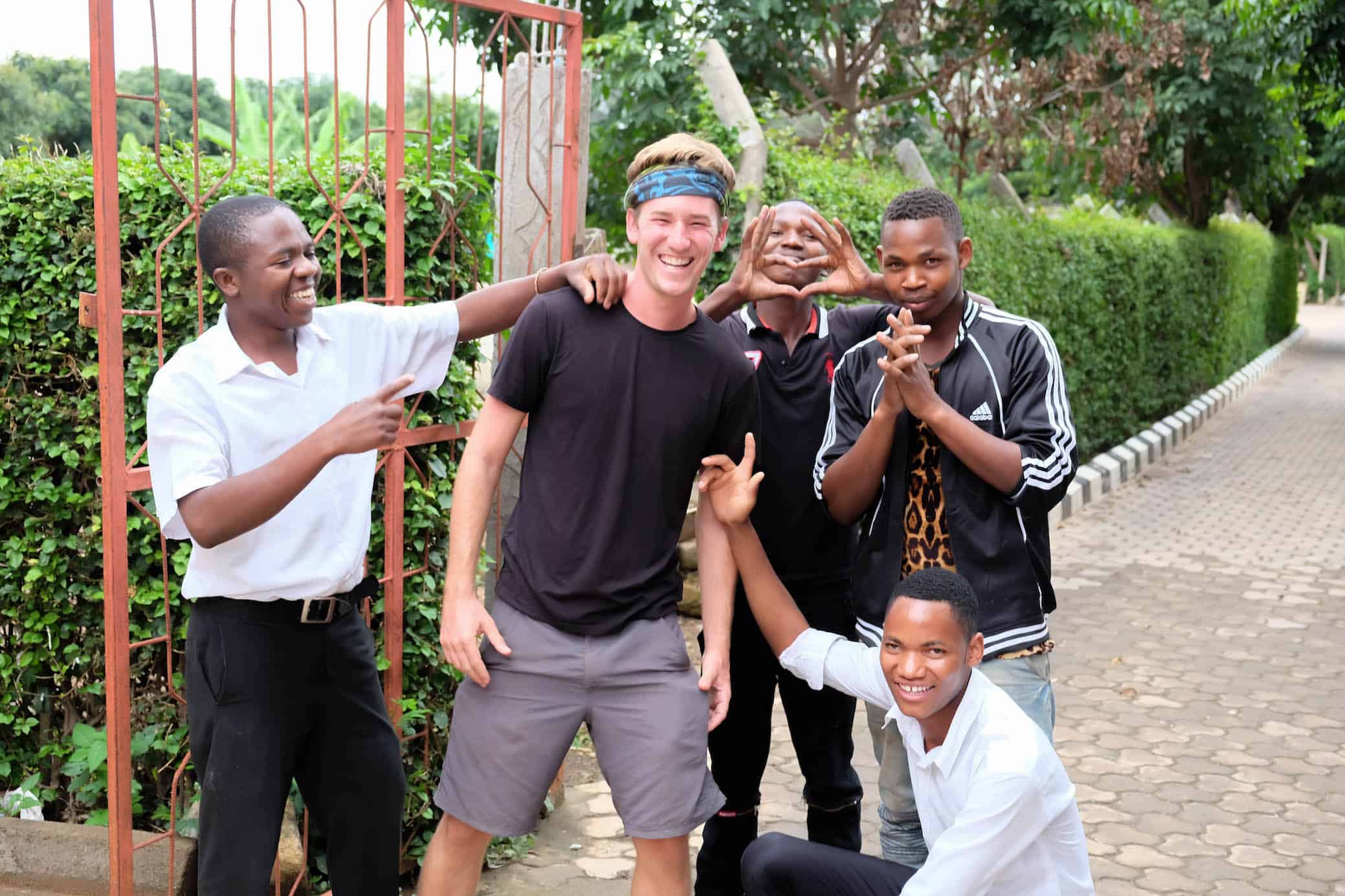
I love my buff. I usually wear it to keep my hair back. A barber can be pretty tough to find in Africa, but it’s also served its purpose as a scarf, face covering (dust), and wet rag. Buffs last for years and aren’t only helpful in Africa. It’s been one of my top travel accessory investments ever!
Sunglasses

Protect your eyes from the sun in Africa since you’re near the equator. There are many sunglasses options, and everyone should own at least a pair. It’s best to make sure they have UV protection for the health of your eyes. We made our first investment in quality polarized sunglasses with a pair of SMITH Optics Lowdown 2. Truthfully, not everyone needs to invest $150 in a pair of sunglasses. Our first trip to Africa was with $5 pairs from the side of the road.
What To Pack For Africa
Camera with Telephoto Lens

If you can swing the money and are going on an African safari, I highly recommend investing in a proper camera. Those lions don’t look quite as majestic on an iPad. If it’s your first time on safari or traveling around Africa we have a great post on the best safari cameras.
Smartphone

We live in a digital age, and I hate to say this, but our phones are our lifelines in Africa. They are our maps, news sources, and online social lives; yes, they are even used as telephones to get around. We always get a local SIM card when we arrive in a new country. Data is cheap in most of Africa, so there is no excuse not to get a SIM card. Granted, sometimes it can be more hassle than it is worth.
Travel Adaptor
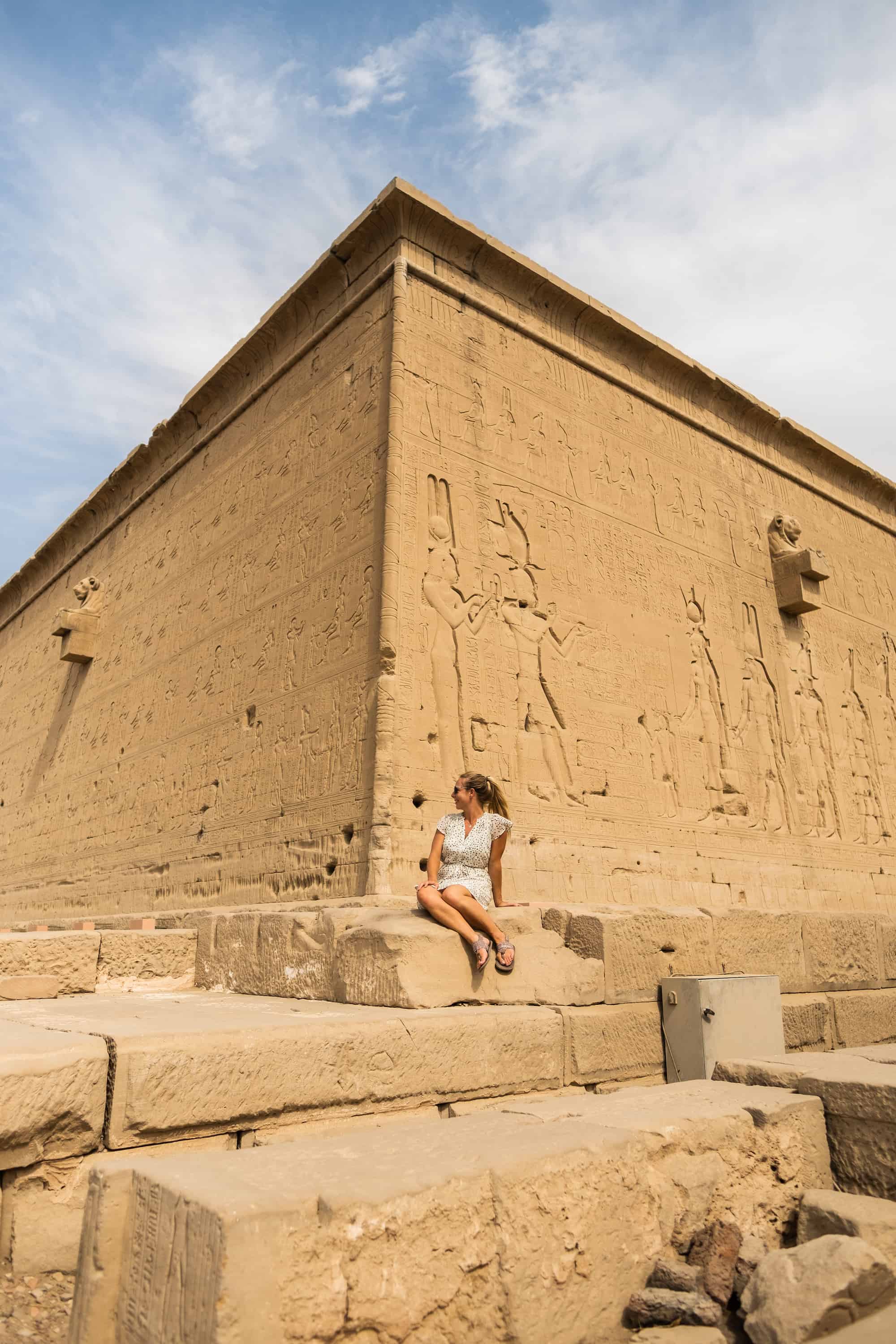
One of the last things when considering what to pack when visiting Africa is an adaptor. Most of Southern Africa uses the plug M. We arrived in Johannesburg without this adaptor and were stuck venturing around the city at night looking for one (not ideal). The further north you go the more you will see the British “type G” plugs. I would recommend getting a good one on Amazon before arriving.
Travel Adapter Recommendation
Sunscreen
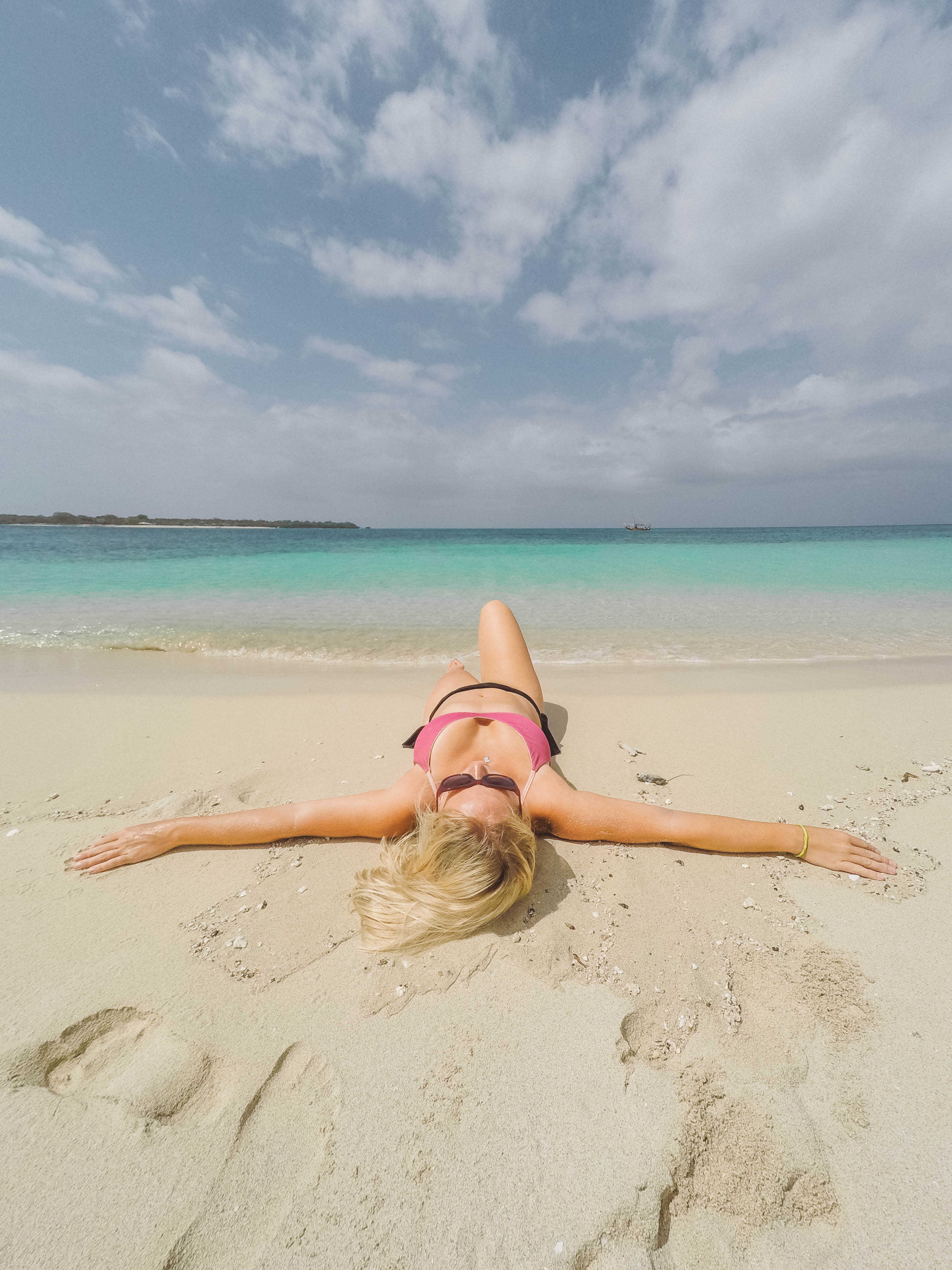
Skin cancer is for real! Don’t forget your SPF when traveling around Africa as you’re close to the Equator. We recommend ordering some online before leaving the house as you will need it underneath the African sun and it can be very hard to find in grocery stores in Africa (and when you do find it the pricing will be insane).
We highly recommend getting an eco-friendly sun cream that does not contain harmful chemicals. They’re mineral-based and usually only cost a few dollars more to help protect our oceans. If you’re not going to swim in the ocean just go with a reliable name brand.
Eco-Friendly Sunscreen
Grayl Water Bottle
It’s not advisable to drink tap water in most of Africa, so we carry a Grayl Water Purifier. This is a purifier, not a filter. The Grayl water bottle system purifies water vs. filters. Purification removes viruses and virtually removes all threat of waterborne illnesses.
We previously used the Lifestraw Go and had good experiences with the bottle for the most part. However, it is a filter and not a purifier, which is effective, but not perfect. Luckily, we’ve never had food poisoning in Africa (shocking!). However, we distinctly remember our entire hostel in Morocco getting sick from the water, but not us, thanks to our filters.
Grayl Purifier Recommendation
Hand Sanitizer
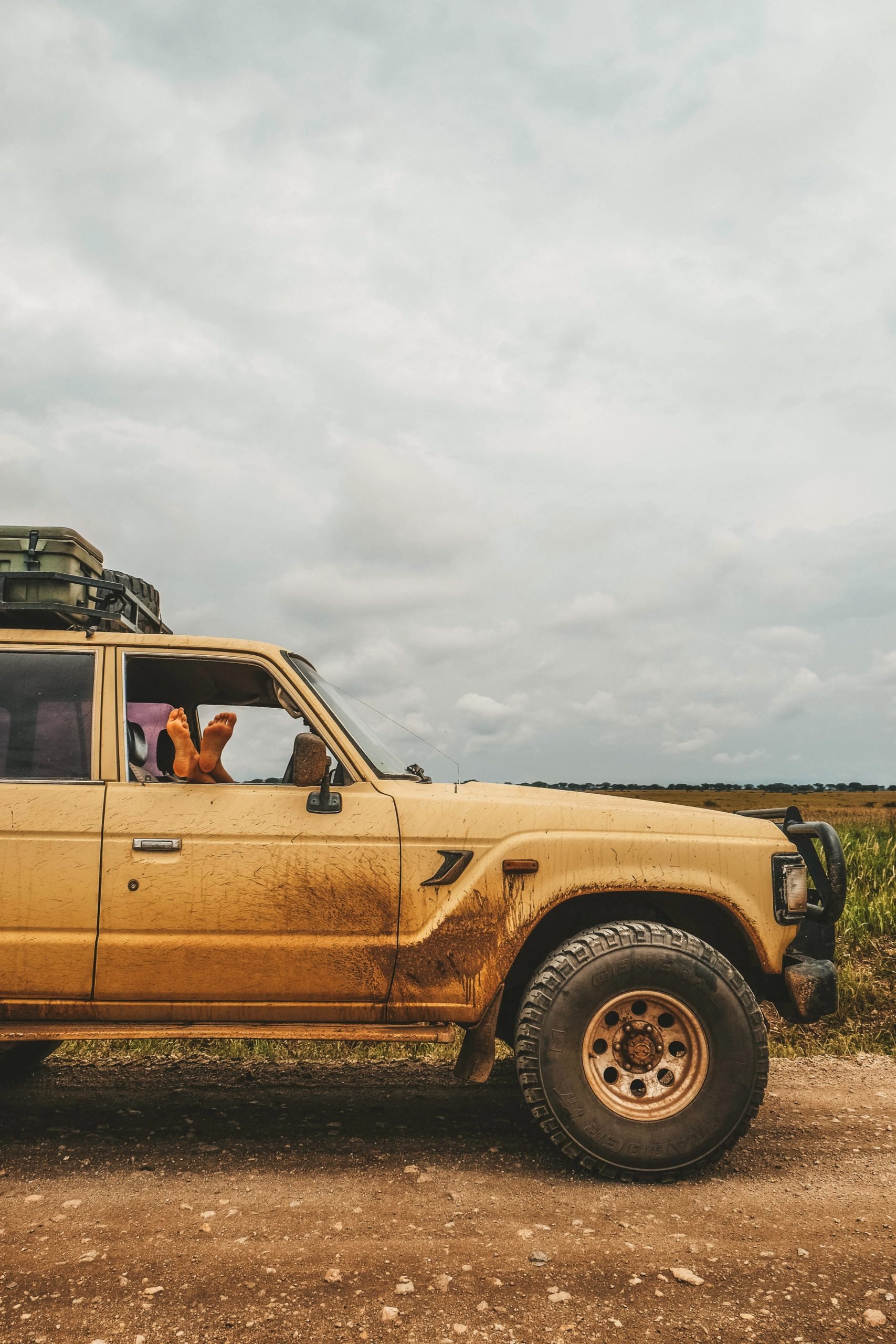
Walking around and taking part in everyday activities in Africa can get pretty dirty. It was also a reoccurring theme to find hand soap nowhere. You can’t go wrong bringing some hand sanitizer and baby wipes in your bag.
Insect Repellant

We recommend packing a bottle of insect repellant with DEET so you’ll scare away those annoying biting demons. It reduces the chances of Malaria or Yellow Fever. DEET can destroy plastics, so mind your sunglasses or camera when applying. It’s good to bring a small bottle, but it’s easy to find great insect repellent all over Africa as it’s commonly used to prevent malaria.
Electrolyte Tablets

Dehydration in Africa is a real concern and should be taken seriously. These tablets should get your body back to normal should you fall sick. You may not need a whole bottle, so take a few in a plastic bag or pill holder to save luggage space in case you need them.
Electrolyte Tablets
Pillow and Sheets
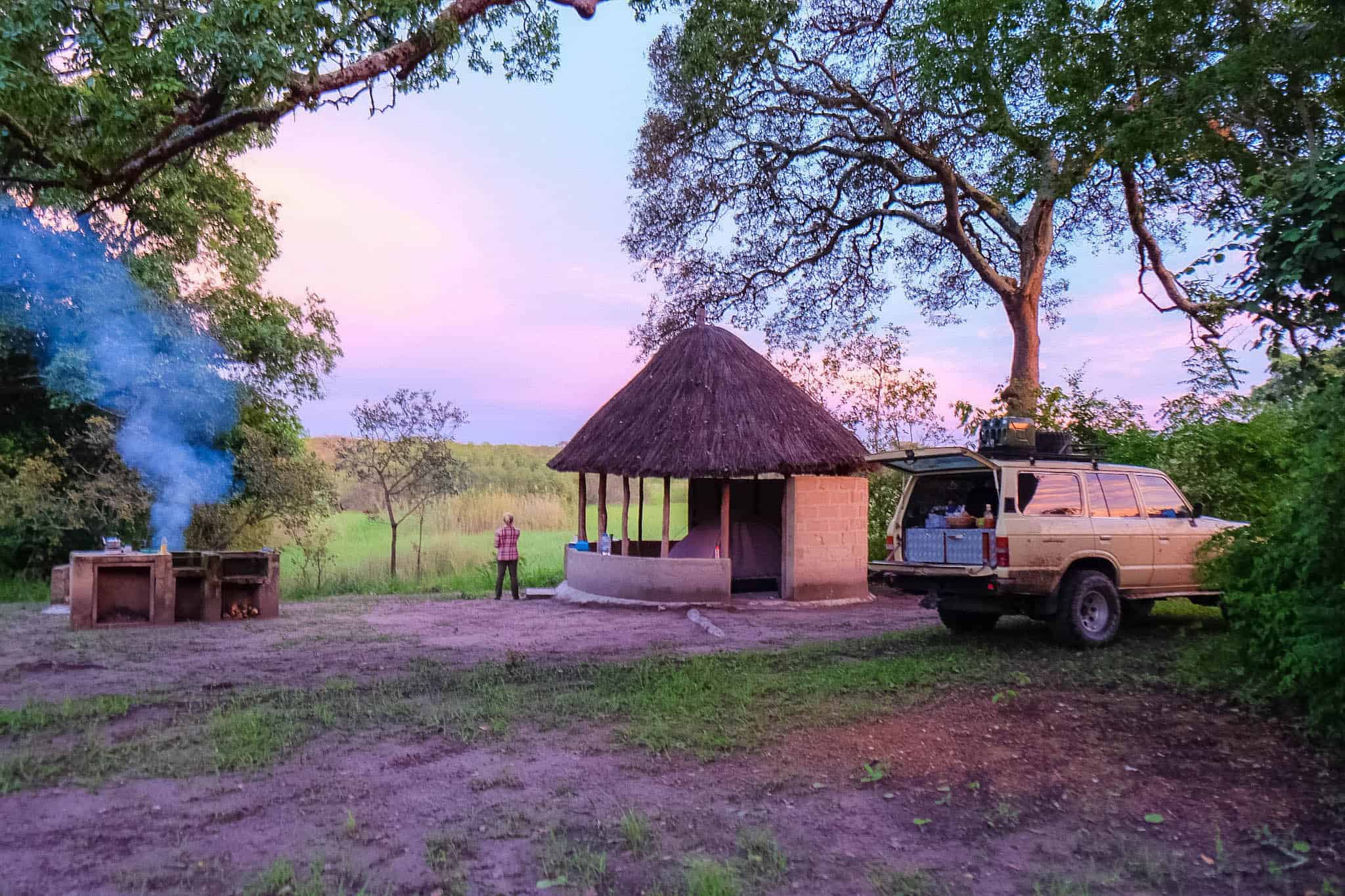
Certainly not a necessity when packing for Africa, but it comes in handy when you get to a room and find the conditions are…less desirable. A sleeping bag liner or even a sleeping bag also does a great job!
Sleeping Bag Liner Recommendation
Dental Floss
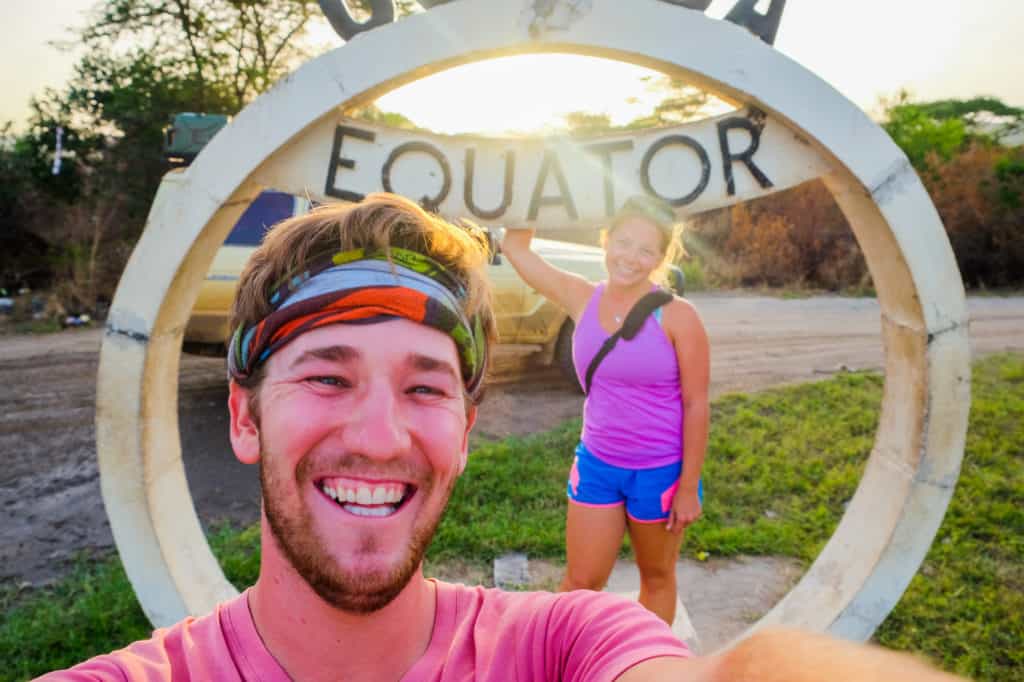
If you cherish your teeth, pack extra floss before you get to Africa. Toothpaste and toothbrushes can be found just about anywhere. However, we had a hard time finding dental floss.
Contact Solution

I have terrible eyesight, but I also hate wearing glasses. Contact solution isn’t easy to find in Africa, and when you do find them they will be expensive. If you wear contacts, add some to your Africa packing list.
Guide Book

Sometimes, it’s nice just to have an actual book in your hands when traveling. We recommend picking up a Lonely Planet to get you through the wireless nights.
Shop For A Guidebook on Africa
Medical Packing List for Africa
Medication For Malaria

Many people think that malaria is similar to the flu and isn’t that serious – this is not the case. Malaria is very serious and, if not treated, can even lead to death. Research and determine if you are traveling to a malaria zone on your African trip.
Most of South Africa, Namibia, Botswana, and Northern Africa are unaffected by malaria. Malaria is a vector-borne illness spread by mosquitos, requiring water to live and reproduce. It’s very rare to find Malaria in arid climates.
I advise waiting until you land in Africa to get your malaria medicine; it is cheaper, and I find the information to be better than Western doctors who can barely diagnose the symptoms. If you don’t have the time to get medicine after you land in Africa make sure you have enough for your entire trip before your departure.
Two different types of medication are used for malaria prevention: Malarone and Doxycycline. It’s best for those on a short trip to take some form of malaria prevention, as both come with their side effects.
In all our time in Africa, we have only taken prevention for about two weeks while in Malawi because of its high risk. For numerous months on end, taking a drug posed too much risk to our bodies. Some volunteer programs require their members to take some form of medication regularly. It’s also worth picking up the treatment over the counter when you land in Africa (Mozambique and Malawi sell it OTC).
The key to malaria prevention is to avoid mosquito bites first! Wear long sleeves in the evening/night, spray insect repellant, and use a mosquito net at night.
Additional Medicine

If you forget medicine at home, don’t panic! Pharmacies are located in many of the towns and cities around the continent. We were able to find everything we needed when we landed in Johannesburg. However, having a decent first aid kit is a good idea if you’ll be remote, like some Peace Corps volunteers.
- Diarrhea Medicine (Pepto Bismal)
- Acetaminophen (Tylenol)
- Antihistamine
- Antiseptic cream
- Butterfly Suture (This came in handy one night in the bush…)
- Calamine Lotion
- Burn Cream
- Mosquito repellant
- Antibiotic (You can get this OTC outside of the US)
You Should Get This!

We never travel without travel insurance from Heymondo. Natasha is a bit of a worrywart and would rather stay safe than sorry. Heymondo offers incredible flexibility and great plans!
You never know if the worst could happen while you’re abroad, and often, your insurance plan at home will not cover medical emergencies abroad. Having the peace of mind that we have a good backup plan helps us sleep at night.
Get A Travel Insurance Quote
How To Wash Your Clothes in Africa?

You’ll always be able to find local women who will wash your clothes for you. For a small fee, they will hand wash, hang dry, and many times iron your clothing for an affordable price. It’s a great way to support local families as women can do the work at home.
I highly recommend seeking them out. We do so by asking our accommodation staff for recommendations, many times it was one of their close relatives who did it for us. For our camping times when no one was around, we often used our Scrubba.

Africa Packing List Summary

All of these items I have and have tried and tested throughout Africa. Whatever you bring, remember that you will be able to find most things you need in Africa (especially in the capital cities), but outside of them, you will have a very tough time.
Plan Your Trip to Africa
- Travel Insurance: We don’t travel without travel insurance and neither should you. You never know what can happen while traveling so it’s best to be prepared. HeyMondo provides excellent short-term and long-term travel insurance plans.
- Travel Waterbottle: When we’re uncertain about the water supply we use our Grayl Purifier. It’s come in exceptionally handy around Africa.
- Camera Gear: Chances are you’ll want a camera for your trip to Africa. We love the Sony RX100V for a pocket-size camera and the Fujifilm XT-4 for a professional camera. Check out our favorite cameras for Africa.
- Safari Clothes: Lightweight, beige, and moisture-wicking clothing are great for traveling Africa. See our favorite safari clothing here.
- Safari Hat: A good hat is both stylish and functional.
- Safari Bag: A durable bag is ideal for traveling around Africa.
- Safari Pants: We recommend neutral-colored pants as they’re great at hiding dirt and can match most shirt colors.
- Safari Shirt: Shirts like these are lightweight and keep the bugs away!
- Boots: While you don’t need to wear sturdy shoes every day, at least one pair of safari boots will make your trip nicer!
- Travel Adapter: You’ll need a special travel adapter for traveling to Africa. Get one before you get there so you don’t pay a premium on the ground.
Read Next


What a helpful and thoughtful write up ! Really appreciate your insights and simple explanations – makes it seem manageable all of a sudden! Takes the angst away – thanks!
“Just because it’s Africa”…seems sadly tone deaf!
Maybe not tone deaf, but the wrong choice of words. What we mean is it’s not all bush and villages there are nice restaurants, bars, and even fashion trends set by many Africans.
Hey, don’t forget books! Twenty years living in Africa taught me that I’d be sitting around waiting a lot of time. E-books and the ability to get them on line changed my life. But, what to read to prepare or enjoy the places you’ll find yourself? I’ve got ideas on that…
ooh I can’t believe I missed that- will add it in on the next update!
This is a complete guide, Thanks for sharing!
I ve lived 4 years in East Africa and I learned the following: one item in your packing list I would not recommend: asperine. You should always opt for Paracetamol. The safest option when your “flue” turns out to be dengue fever.
You’re right. That’s a great tip! We’re going to update that now.